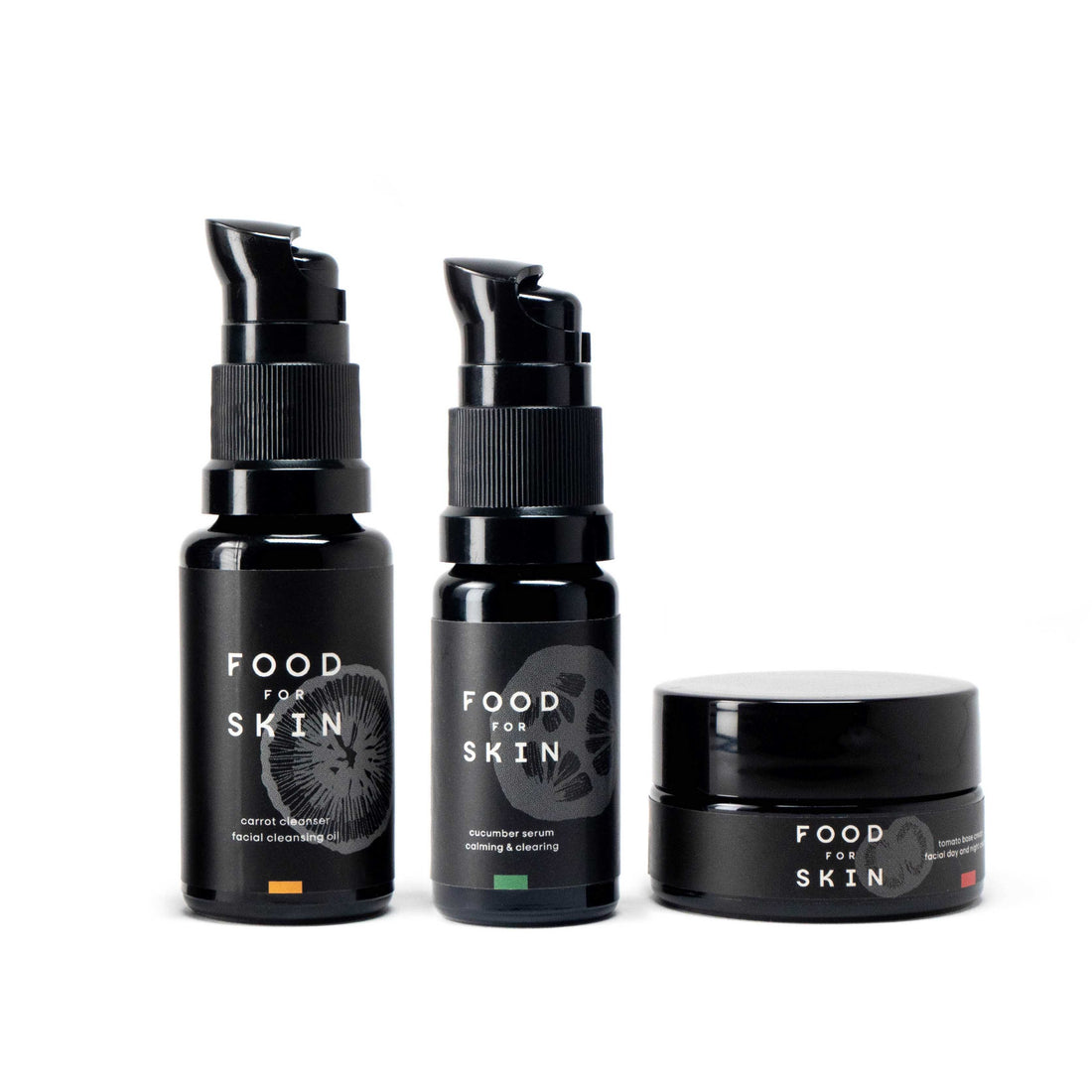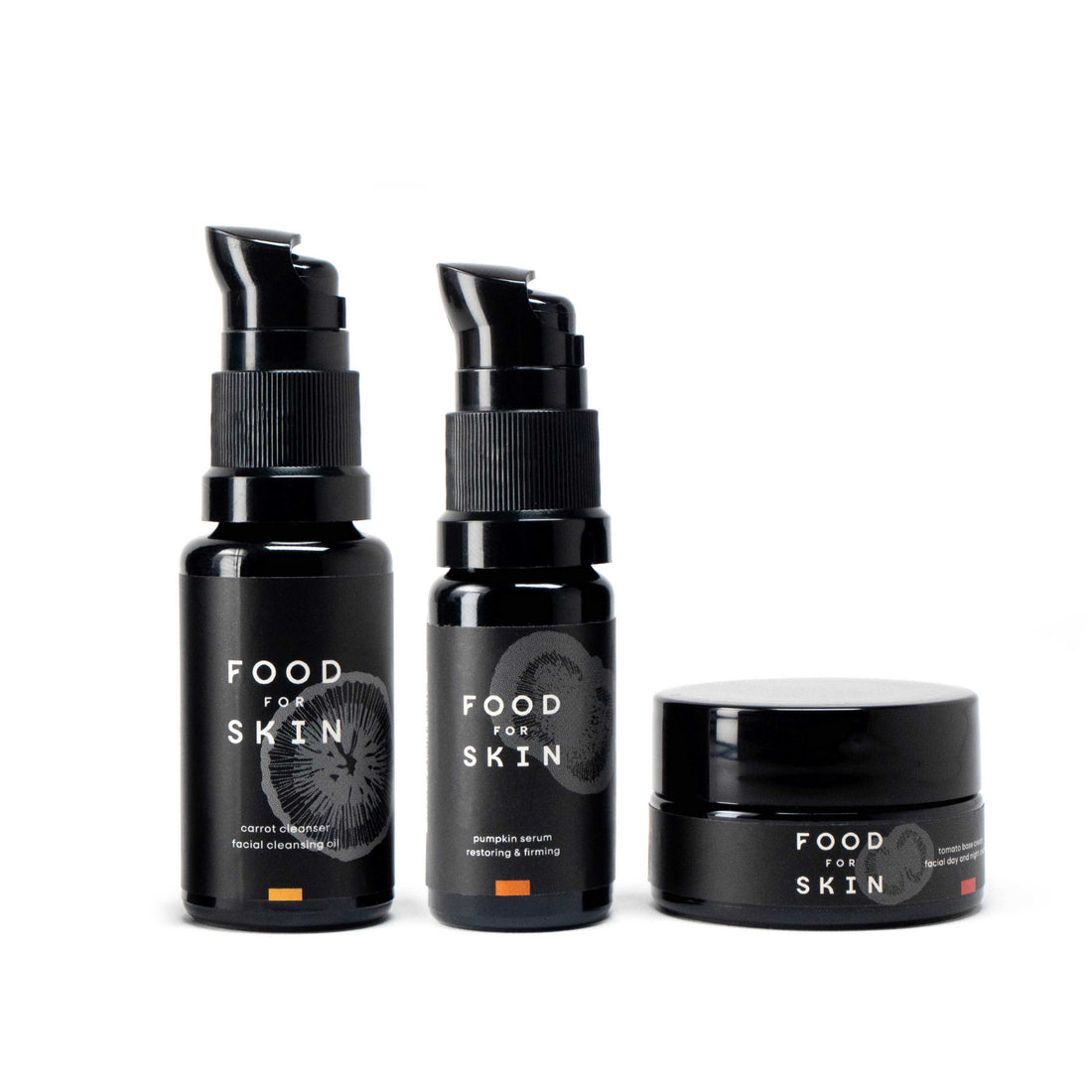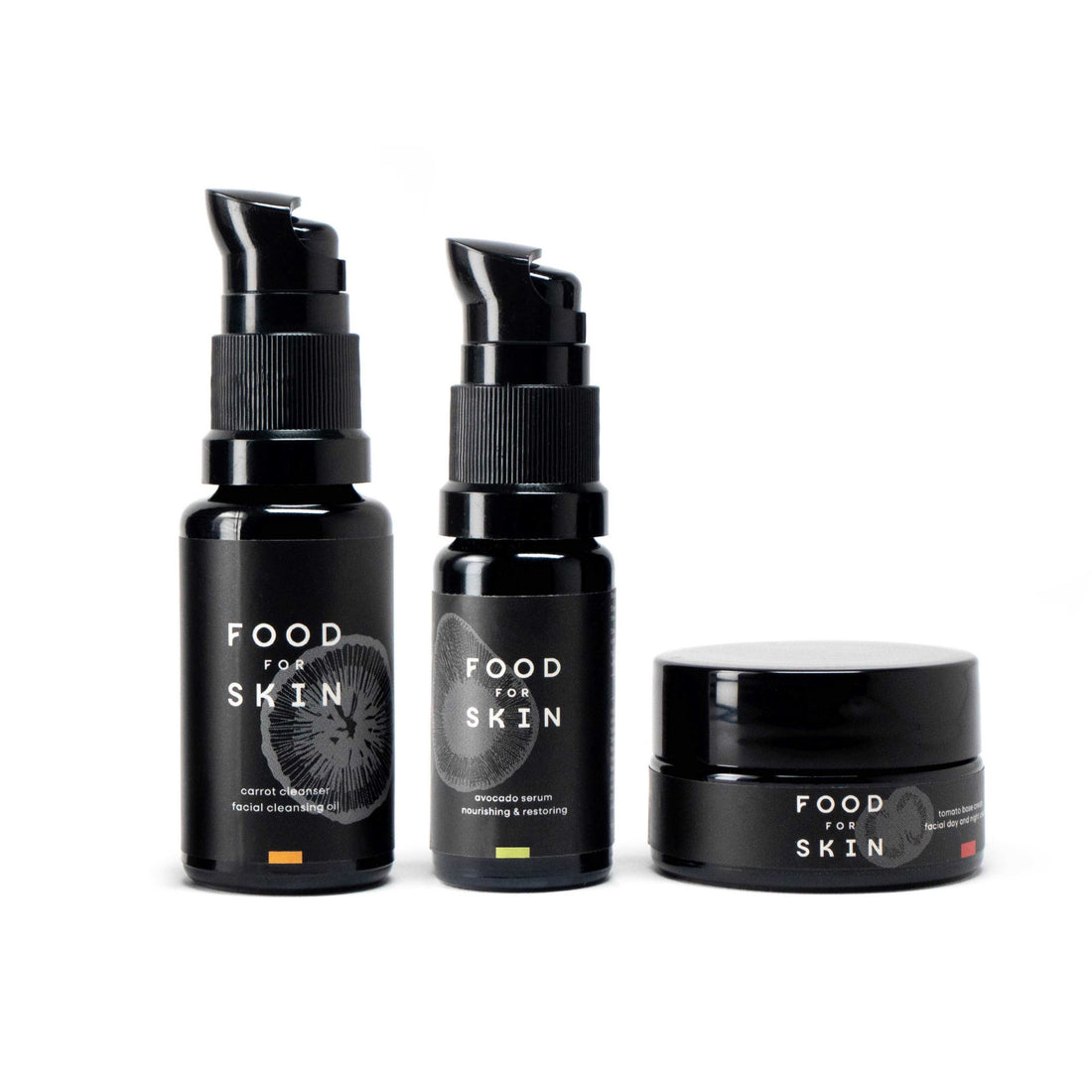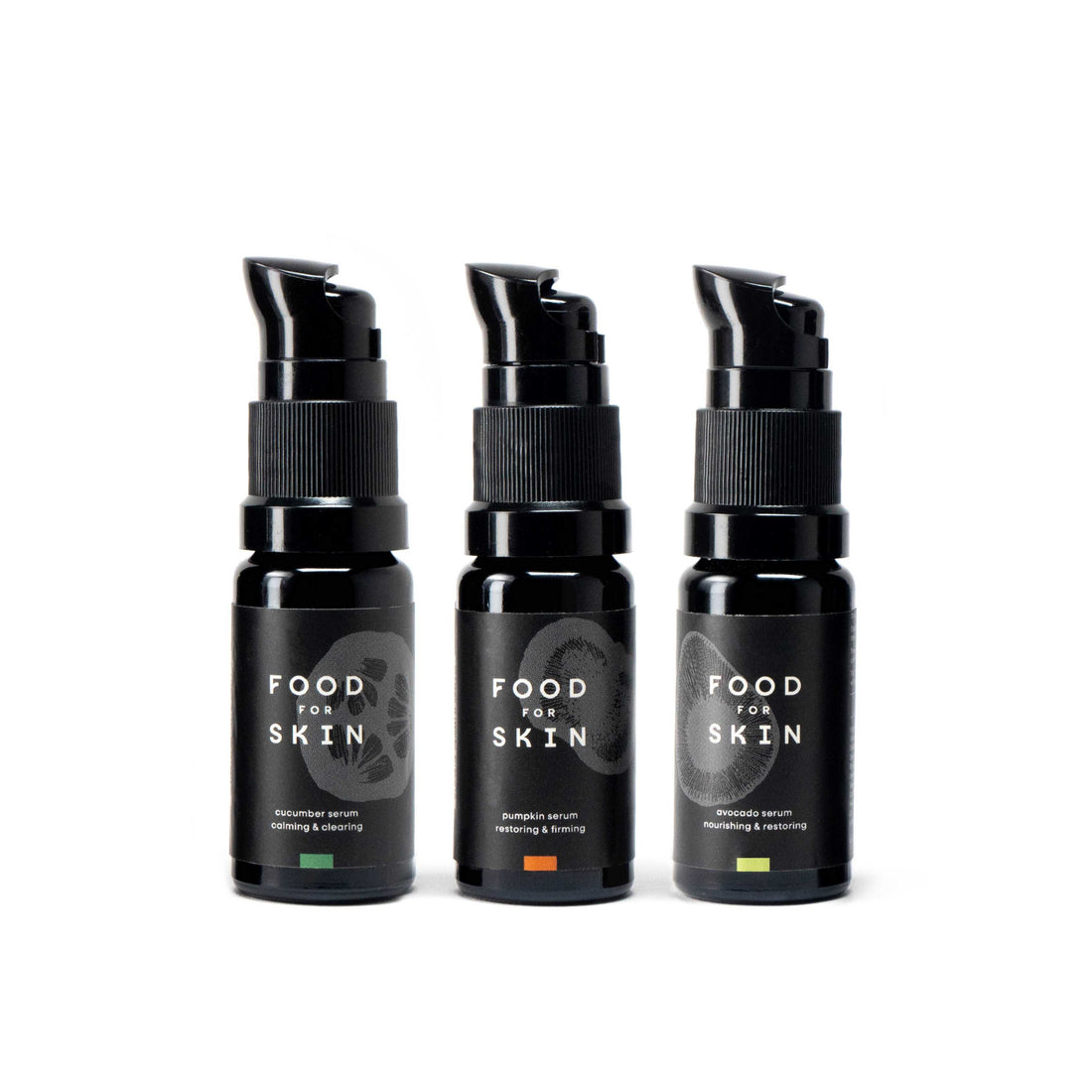In our skincare we use the most powerful and nourishing ingredients from nature: vegetables, fruit, plants and seeds. Why? Vitamins! Many people know that it is good for your body, but also for your largest organ: your skin.
There is almost a whole alphabet of vitamins 😉, but how do you know which ones are good for your skin? In this blog we will discuss those vitamins that are good in skin care, so for applying to the skin. It is even more important to also eat those vitamins and minerals through food, we already wrote a blog about that.
Vitamins for the skin
The vitamins we discuss for on the skin are:
- Vitamin A
- Vitamin B
- Vitamin C
- Vitamin E
- Vitamin K
Vitamins are natural organic compounds that are vital for the maintenance and health of the skin, the largest organ of our body. In adults, loss of skin elasticity is usually related to the inevitable aging process, but can also be due to a deficiency of vitamins A, B, C, E and K.
We cover five beneficial vitamins and how they are used in skin care products to support skin elasticity and therefore reduce the signs of aging.
What does vitamin A do for the skin?
First, let's start with vitamin A. Vitamin A is a group of fat-soluble, unsaturated organic compounds and its derivatives are known as retinoids or carotenoids.
Retinoids are found in animal sources (e.g. fish, eggs, milk, cheese, etc.) and include retinol, retinyl acetate, and retinyl palmitate, while carotenoids are found in plant foods (e.g. carrots). A common example of a carotenoid is beta-carotene.
How Vitamin A Works
When retinol is applied to the skin, enzymes in the skin convert retinol to retinyl aldehyde and then to retinoic acid. This conversion can take a few weeks to occur, so it is advised that products containing vitamin A should be used for a few months before you start to see effects.
There are also studies showing that both retinol and its derivatives can also thicken the epidermis and synthesize collagen in aging skin.
Vitamin A against wrinkles
Vitamin A and its derivatives are also powerful antioxidants. As a result, vitamin A can help build collagen fibers in the dermis, which strengthens the tissues in the skin, restores elasticity to the skin, and thus repairs or improves more efficiently wrinkles and fine lines caused by frequent sun exposure.
Vitamin A skin care with Food for Skin
Which Food for Skin products are vitamin A creams and serums? Food for Skin is vegan and 100% natural and therefore does not use animal or synthetic retinol, but carotenoids from plants can be found in the following products:
- Carrot Cleanser – (carrot beta-carotene, carrot extract, cardamom)
- Tomato Base Cream – (konjac, broccoli, lemongrass, avocado, broccoli, shae)
- Cucumber Serum – (broccoli)
- Pumpkin Serum – (cucumber herb)
- Avocado Serum – (avocado, broccoli)

Vitamin B for the skin
Vitamin B is a general name used for a group of vitamins that consists of eight different forms. Each of these forms is water soluble and has its own importance in body functions. The eight forms of this vitamin are listed below:
- Vitamin B1 – Thiamine
- Vitamin B2 – Riboflavin
- Vitamin B3 – Niacinamide / Niacin / Nicotinic Acid
- Vitamin B5 – Pantothenic acid
- Vitamin B6 – Pyridoxine
- Vitamin B7 – Biotin
- Vitamin B8 – Inositol
- Vitamin B9 – Folic acid
- Vitamin B12 – Cobalamin
Vitamin B3 skin
Vitamin B3 is the most common form of vitamin B used in skin care. It stimulates and regenerates the protein collagen.
Niacinamide also has antioxidant properties that help protect against skin damage that can result from UV rays from the sun and environmental pollutants. These free radicals can break down collagen and elastin in the skin, leading to the formation of wrinkles that are often characteristic of aging skin. Niacinamide neutralizes the free radicals and breaks the free radical chain, so that damage can be reduced or prevented.
Which Food for Skin facial products contain vitamin B?
- Tomato Base Cream (konjac)
- Cucumber Serum (broccoli)
- Pumpkin Serum (chia)
- Avocado Serum (oats, cucumber herb)

What is vitamin C good for?
Vitamin C is a naturally occurring, water-soluble vitamin (also available in oil-soluble ester forms) commonly known as L-ascorbic acid. There are multiple forms of vitamin C:
- Ascorbyl palmitate
- Sodium ascorbate
- Sodium ascorbyl phosphate
- Magnesium ascorbyl phosphate (MAP)
- Tetrahexyldecyl Ascorbate (THDA) (also known as Ascorbyl Tetraisopalmitate)
- Ascorbyl Glucoside
- Ascorbyl Glucosamine
- Ascorbylmethylsilanol Pectinate
What does vitamin C do for your skin?
L-ascorbic acid and more stable forms such as ascorbyl palmitate, ascorbyl tetraisopalmitate, and magnesium ascorbyl phosphate are often used in carriers to achieve one of the most important functions of vitamin C: stimulating the production of collagen , an essential structural protein that helps keep skin firm. Vitamin C not only restores but also protects skin elasticity.
Vitamin C is also a powerful antioxidant that protects against free radicals produced by the sun’s ultraviolet rays and other environmental stressors. It does this by neutralizing free radicals and disrupting the chain, preventing damage that leads to wrinkling and skin aging.
Vitamin C is a powerhouse for the following skin conditions:
- Acne prone skin
- Skin with pigment spots
- Hyperpigmentation
- Wrinkles
Vitamin C for your skin with Food for Skin
All Food for Skin skin care products are packed with vitamin C. Effective skin care with the goodness of vegetables!
- Carrot Cleanser (carrot, cardamom, ascorbyl palmitate)
- Tomato Base Cream (broccoli, konjac)
- Cucumber Serum (broccoli, rosemary)
- Pumpkin Serum (sea buckthorn, rosemary)
- Avocado Serum (hemp, broccoli, elderberry, borage, rosemary)
- SPF30 (kakadu plum).
Did you know: the Kakadu plum has the highest vitamin C content in the world!
What foods contain vitamin E?
Vitamin E is a fat-soluble compound that exists in several forms; alpha-tocopherol, beta-tocopherol, gamma-tocopherol, delta-tocopherol and a family of compounds called tocotrienols.
What does vitamin E do for your skin?
Vitamin E is truly an all-rounder and offers many benefits for use in cosmetics for your face. The most important benefit is that it is an antioxidant. You often hear that term, but what is it actually? An antioxidant fights free radicals, it is truly a 'fighter' that takes on the battle with things in our environment that could potentially damage the skin: certain parts of UV light, polluted air (we unfortunately have that everywhere in the Netherlands), weather influences such as acid rain, etc. Vitamin E also helps to support the elasticity of the skin.
All Food for Skin skin care products contain vitamin E:
-
Tomato Base Cream (konjac, tomato, avocado, shae, broccoli, sunflower)
-
Carrot Cleanser (sunflower, plum, castor, plum, carrot)
-
Cucumber Serum (cucumber, rice, broccoli, sunflower)
-
Pumpkin Serum (pumpkin, sunflower)
-
Avocado Serum (avocado, elderberry, sunflower)
-
SPF30 (bilberry, raspberry, karanja)
Vitamin K for the skin
Vitamin K is a fat-soluble compound that exists in two structurally similar forms as listed below;
- Vitamin K1 – phylloquinone (natural form) / phytonadione (synthetic form)
- Vitamin K2 – menaquinone
Vitamin K1 is now banned in Europe.
Vitamin K2 is important in maintaining healthy skin and helps prevent fine lines. It can prevent calcification (the build-up of salts in the skin), which can help maintain elasticity.
Which Food for Skin products contain Vitamin K?
- Avocado Serum (oat)
As you have read, all Food for Skin skincare products are packed with vitamins! Don't forget to nourish your skin as well as your body.
Are you not getting enough vitamins through your daily diet? Then choose pure, clean supplements such as Goldea. This is sustainable, made in the Netherlands with only the best from nature. Without artificial plastics!










